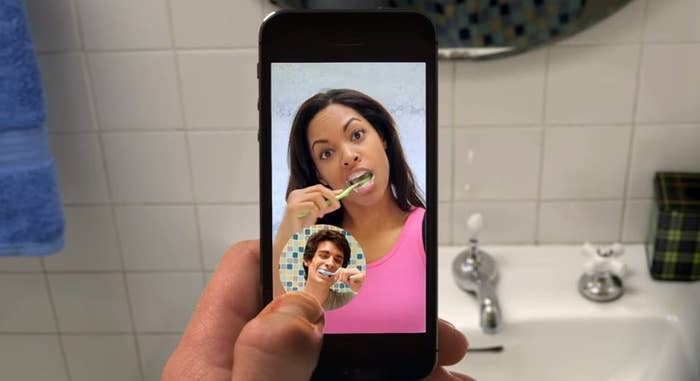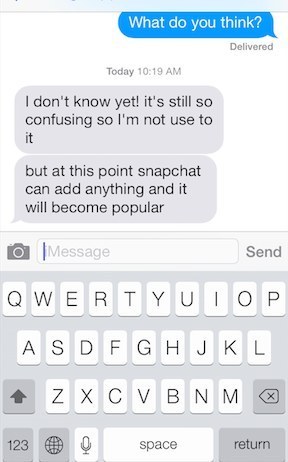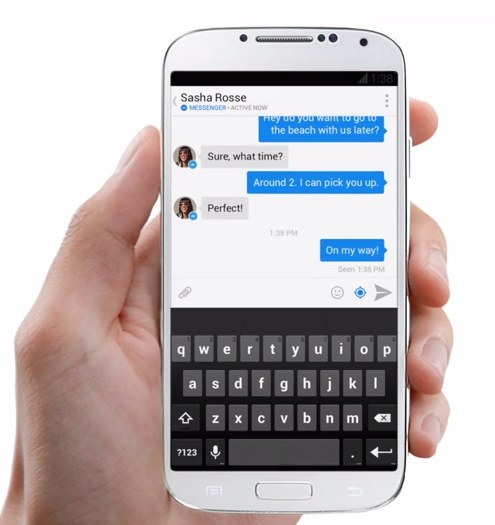
Josh Miller is the co-founder of Branch and Potluck. He is currently leading a new product initiative at Facebook. This post originally appeared on Medium, and is reprinted here with the author's permission.
Just over one year ago, I typed up notes from an informal conversation with my sister and satirically titled it, "Tenth Grade Tech Trends." It struck a chord. So I decided to do it again.
It's easy to make fun of the "what are teens doing?!" meme. The criticism is fair. We've gone a bit overboard in our fascination with the social habits of our younger siblings and relatives. That said, my biggest gripe with the tech industry today is that we tend to lack empathy — true, practiced empathy, not just written design maxims — for people who are not like us (the vast majority of people). So while the anecdotes of a sixteen year old public high school student from Los Angeles are not representative, and will not help you find the next Facebook, I do think the practice of pausing, asking questions, and listening to other people is a good one that should be practiced much more.
For that reason, I did it again this year, and had another, casual conversation with my sister about the apps her and her friends use. Same sister, new grade. Here are the Eleventh Grade Tech Trends.
Snapchat
The ephemeral messaging app is more popular than it has ever been. Surprisingly, my sister cites the (relatively) new Stories feature as being a "huge success" and a large factor in the service's increasing usage. She described the feature as being, "a non-judgmental Newsfeed to share what you're doing, who you're with and, most popularly, how pretty you look." That's quite a big addition (and new market) if you consider how much Snapchat was already dominating the messaging/communication use case.

The other day Ev Williams mentioned that he thought that all successful products have an original, core innovation, and then a subsequent rocket ship one that puts the service over the edge. For Facebook, the former was "friending" and the latter was Newsfeed. For Snapchat, the core innovation was ephemeral messages. Could Stories be their rocket ship? It sure sounds like it.
Even if it isn't, there is a lot of brand loyalty and enthusiasm surrounding the company right now. When I texted her, asking what she thought of the "Chat" update, she responded:
I don't know yet! it's still so confusing so I'm not use to it
but at this point snapchat can add anything and it will become popular
That speaks for itself.
My sister described the photo sharing network as "where you express who you are," which benefits from an "always interesting, specific" feed. Though still wildly popular, my sister mentioned that anxiety around "like-to-follower ratios" and "judgmental viewers" has been leading to less posting amongst her and her friends. I'm twenty-three, which is old compared to my sister, but even I have seen this sentiment pop up in my feed:

When I see a subtweet
Twitter is getting popular in her high school because of "SUBTWEETS" (emphasis hers). It's also an "acceptable way to post statuses" which apparently isn't cool to do on Facebook anymore. My sister was quick to point out that the service "only attracts a certain crowd" but it sounds like Twitter is more popular than it was last year. Given that her and her friends have private accounts it also seems as though her Twitter feed looks a lot like the Facebook Newsfeed of yesteryear (a.k.a. when I was in high school), when people used to post informal status updates very frequently.
Unfortunately for Twitter, it sounds like Snapchat Stories are starting to eat into some of their use cases. For one, the new Snapchat feature is broadcast sharing, a la Twitter, except since there are no Favorites or Retweets (or metrics at all to judge relative popularity) people are less anxious about posting a lot, and informally. Secondly, I kid you not, "Subchats" are getting big:
It is the only socially acceptable way to send somewhat anonymous messages about how you are feeling, without the confrontation. Because there is no direct recipient of the message, there is no real risk or responsibility in writing the post. With snap stories, users are able to not only post these types of messages through pictures, but can also see who has viewed their message.
That being said, the one thing Twitter still has over Snapchat are the "range of topics and accounts."
The one difference between Snapchat and Twitter is the community. Snapchat is strictly friends who you have accepted and serves only one direct purpose. Twitter is filled with funny accounts, friend accounts, professional accounts, all that post about various topics.
Who would of thought my sixteen year old sister would use the word "community" to describe why she likes a social network?

Disclosure: I recently sold Branch, the company I co-founded and led, to Facebook.
Strengths
Most commonly used media site…
Interesting that she chose the word "media," which she used to reference things like YouTube videos, BuzzFeed articles, etc. If that's really her perception of Facebook's Newsfeed it would make a ton of sense that an informal, text-centric status update would seem uncool now.
Universal way to communicate since everybody has Facebook…
This is huge for Facebook — it has become an ubiquitous utility. And my sister didn't even know Messenger, Facebook's well-regarded, standalone messaging app, existed. Couple this anecdote with the WhatsApp acquisition and Facebook seems poised to own (utilitarian and functional) communication.
Only big social network with 'albums' for pictures…
I never even considered this but it makes so much sense! Especially now that people are sensitive to the pace and quality of what they share on Instagram. The photo album as the atomic unit is definitely unique to Facebook.
Facebook documents all aspects of your life from when you first get it, other sites focus on 'the now…'
This must largely be a perception thing: Twitter and Instagram have Profiles and permanent content, too. Probably an interesting lesson somewhere in there.
Weaknesses
Becoming a place of advertisement for peoples' work...
It's "Christmas Card" sharing, and why having the largest network is both a gift and a curse. If you have something you want as many people to see as possible you're going to share it on Facebook. That's a huge asset but also means self-serving, promotional posts are inevitable, too.
Lacks a specific purpose that isn't already better established in a different app
In other words, Facebook's app does everything but focused, single-purpose apps tend to be better at each individual thing. (My hunch is this is more of a brand perception thing than a quality-of-software indicator but same result nonetheless.) Good news for Facebook is that Zuck gets this:
Mr. Zuckerberg said the multi-app strategy is meant to adapt Facebook to the way people use mobile phones, which now account for the bulk of Facebook's visits and advertising revenue. "In mobile, there's a big premium on creating single-purpose, first-class experiences," he said.
School Time Apps
One of the more fascinating anecdotes from my sister was around what apps are popular at what times of the day, a factor I never even thought to consider:
Snapchat also continues to flourish due to its ongoing activity. While Instagram and Facebook tend to stall during school and work, Snapchat and Twitter seem to be quite hectic. They are the apps people bend towards when they are bored and do not have to process what they are posting or looking at. The laid back and non-judgmental environment of the two apps allows them to differentiate from the rest.
Protected Identity
I'll let this one speak for itself:
What is truly missing from the [world of social apps] is an aspect of secrecy and anonymous profiling. The reason programs such as bathroom stall, Ask.fm, Formspring, and Omegle were so popular was because of the idea of a protected identity. The thing lacking from all of the apps — not including Bathroom Stall which was removed due to bullying — is a deeper purpose to keep them running. I am not saying the next big app is going to be based off of anonymous profiles, but I believe it will be the next thing to pop up within other apps. Profiles are what hold social media to be truly 'social' so getting rid of profiling would be a mistake. As a substitute, anonymous messaging could be developed into current popular apps. Facebook creating a way to anonymously instant message others would be a huge success, maybe even Snapchat and Instagram doing the same thing.
All I'm going to say is that in Tenth Grade Tech Trends, my sister mentioned that FaceTime was incredibly popular and could be improved in a new app. At the time, I rolled my eyes: "FaceTime is so awkward!" One year later, Snapchat introduced a FaceTime-esque feature, likely because they were observing similar anecdotes and user behaviors. So my sister's articulation of the implementation is likely off but I have little doubt the desire is real and pervasive.
Oh, and no, she had no idea what Secret was, The Valley really is a bubble.
